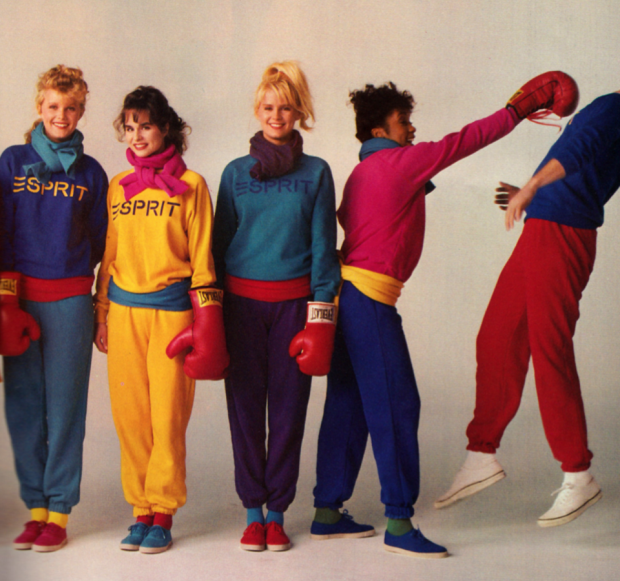Esprit was one of the “must have” brands of the 1980s especially among the teens and young adults. During the early 80s it epitomized the spirit of the era, and a look at the old magazines should explain why.
80s Esprit Clothing Ad
80s Esprit Clothing
The brand’s clothing line was certainly colorful, which was in line with the general exuberance of the early 80s compared to the drab and colorless 70s. Like the neon fad, the colors of Esprit seemed like a beacon that drew eyes upon the clothes wherever you went.
There are many reasons for the appeal of the brand beyond the colors. There was the size and drape of the clothes, for example. Esprit clothing tended to be blousy and oversized, and as such was forgiving for those who were carrying a few extra pounds.
The ESPRIT Brand
The logo was also iconic. The font was an all-cap lettering featuring simple yet broken lines. The letter E didn’t have the vertical line and instead just had 3 horizontal lines. The S had a space in the middle instead of a continuous curved line. The two lines of the T didn’t touch. It was different, and it perfectly suited the need of the youth to be different from their parents. That logo was prominently displayed on the fronts of the shirts and sweaters.
The Iconic Esprit Logo
Then there was the brand name itself. “Esprit” sounded French and exotic, signaling European chic. Of course, it was actually a brand established in San Francisco, but that didn’t matter. For some of the kids wearing them, saying the brand name seemed like they spoke French themselves.
The Culture Of ESPRIT
But perhaps the most important marketing move was the launch of the “Real People” campaign. Instead of featuring models, they had their own employees wearing the clothes in the advertisements. And when you take a look at those faces, you realize that they were sporting real smiles. They weren’t faking at all. They really were happy.
Esprit Real People Campaign Ad
A closer look at the Esprit corporate culture should explain why that was so. In contrast to the general treatment of employees at the time (labor strikes were common then), Esprit took pains to pamper their employees. They made the workplace a happy place. If you’ve read on how Google nowadays pamper their employees, you’d realize that Esprit pioneered the practice.
It started with the workplace. It wasn’t just a drab office with dividers or cubicles. The headquarters was a former winery that was renovated to feature skylights and wooden floors, and the walls displayed Amish quilts. The headquarters also had a trendy café along with a running track and tennis courts.
Management encouraged the employees to dress fashionably and yet casually, and high heeled shoes were not permitted to protect the floors. To get the workers to wear their own clothing line, management saw to it that employees enjoyed a 52% discount on Esprit clothing. And to give them a better foundation for elegant styling, they received subsidized tickets to the opera, ballet, and theatre. They even received foreign language lessons along with free vacations in the mountains.
Workers called their workplace “Little Utopia” and “Camp Esprit”, and they loved working there. Unfortunately, the brand’s prominence didn’t last as their market grew older, but for a time kids (and the young at heart) enjoyed a brand that epitomized youth and exuberance.

